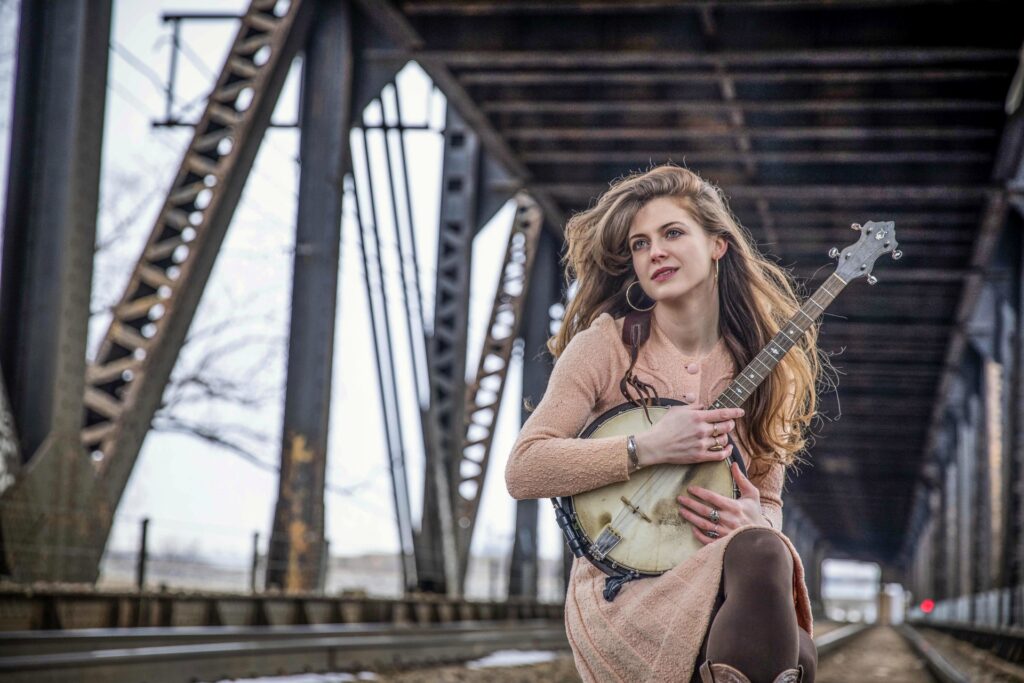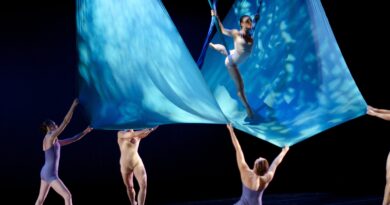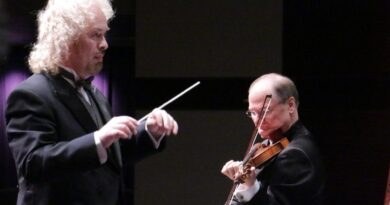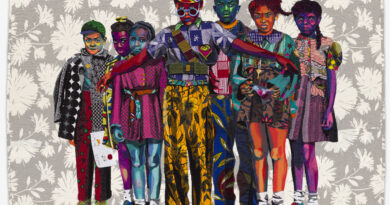LUMINARY: Q&A with Singer/Songwriter Kelly Hunt
When it comes to the core artistic tenants of the Folk/Americana genre, Kansas City-based singer/songwriter Kelly Hunt is what they call the genuine article. In a musical landscape that is in any given year ripe for reflection and authenticity, Hunt is an artist’s artist who revels in the stuff. And why should that surprise? Her entire ecosystem from an early age has fed a sensitivity to diverse musical voices impacting her trajectory, from her mother who sang professional opera and saxophonist father who marinated in the hottest jazz, all amid the musical ethos of Memphis, Tennessee, no less. It’s almost as if necessity dictated she evolve into a professional musician or something 180 degrees removed from the space. When that evolution did materialize, Hunt harnessed her considerable artistic resources to produce her debut album, Even the Sparrow, a stunning, stripped down acoustic paean to modern Southern roots music and the near-raw, evocative intimacy and immediacy that makes that sound so well beloved.
A prodigious storyteller, Hunt revels in the style. But she doesn’t simply rest in those laurels, she adroitly infuses influences from Celtic to Cajun and American Folk styles with a seamless style that truly showcases her compositional muscularity rarely seen so early on in a young career. That first album netted Hunt a burgeoning world-wide following topped off by a nomination for International Folk Music Awards 2019 Album of the Year, and in so doing served notice to many in the space that this was a young artist with something substantial to say and the chops to deliver it in ways few others on the scene can navigate so adeptly.
I had the pleasure of chatting with Kelly Hunt during our year of shutdowns and seclusion, and received refreshing confirmation that this stalled year of concerts and live performances didn’t blunt her spark, but only reaffirmed a trajectory filled with the energy and spirit of an artist’s artist.
Growing up the daughter of an opera singer and a saxophonist had to be an interesting experience for someone who, herself, had aspirations in music. What was it like trying to find where to land with two different worlds of music swirling around you from such an early age?
Yes, I grew up around an eclectic mix of musical influences. My mom was steeped in classical music and trained in opera, but she also loved the Folk music of the ‘60s and ‘70s. And my dad played saxophone and was into jazz music. But, being a 5th generation Texan, he also listened to a lot of classic country music, so I have distinct memories of driving around with him and listening to his Johnny Cash 8-track tape. As an adolescent, I also latched onto a wide range of contemporary Folk/Americana/Indie music, and then later, in my early twenties, I fell in love with old-time Appalachian music, and that was a very defining moment in my musical formation. It’s also worth noting that I was born and raised in Memphis, TN—the cradle of delta blues and early rock-n-roll. So the musical heritage of my hometown shaped me in a real way too, almost by osmosis.
You’ve mentioned that influences growing up included Norah Jones, Rachmaninov and John Denver. Can you look back now and see how each impacted the artist you’ve become today?
Oh definitely. I did have a pretty classical formation early on, taking piano lessons and singing in choir. And I loved the Romantic composers especially…even as a child, I just loved how evocative that music is, how it really can make you feel so much, just purely with music. So my first compositions were instrumentals on piano, really. And even now, I often conceive of songs that way, thinking in terms of “movements,” like a piano concerto or a symphony…that sense of tension and release. But I also love the pithy, hooky songs of James Taylor and John Denver and the simple, truth-telling songs of Mississippi John Hurt and Ola Belle Reed. And I do see aspects of all those various musical influences reflected in my own writing, definitely.
What are some of the biggest influences for you in today’s music?
Gillian Welch is a big one for me…when I first discovered her, I was so struck by the timelessness of her music. She is so deeply rooted in the American folk music tradition, and yet her music still feels so personal and relevant and distinctive. I also really love Abigail Washburn. Her approach to banjo is so classically old-time, and yet she combines these time-honored techniques with a writing style that is so fresh and interesting and truly genre-bending.
I have also been big into Gregory Alan Isakov lately…his music is so painterly, both lyrically and musically. He creates a whole atmosphere of sound using acoustic folk instruments, and I find it really transcendent.
And Sarah Jarosz, she’s way up on my list these days too. I guess in general, I really gravitate to artists who are creating contemporary music that is rooted in traditional forms and yet adventurous, forward-leaning.
Tell me about the decision to make a career of music. Was it a struggle for you or did it simply come as a next step in your own evolution?
I didn’t even begin to have an inkling of an idea that I wanted to pursue music professionally until about six years ago. I grew up around music, of course, and it has always been a part of my life, a very important part. And I’ve been writing music since I was a kid. But it had always been a private exercise that I, at most, shared with close friends and family in choice moments. It wasn’t something I really felt comfortable sharing beyond that inner circle. But that changed, I guess, when I hit my early twenties. I had spent a few years running around the country trying on a number of different careers, and nothing was sticking.
I felt restless and frustrated and confused. And music just kept bubbling back up to the surface in those moments. Finally, at one point, in between jobs, I had about a month off, and in the space of that month, I just started writing a ton and practicing a lot and, ultimately, felt this compulsion to start playing some open mics. And doing that kind of set everything in motion in a very natural way.
I started getting gigs and then recorded a demo and then started working on a full-length album. Music just took up increasingly more space in my life, and I realized somewhere along the way that that’s exactly how I wanted it to be, that I didn’t feel confused anymore about what I wanted to be doing with my life. So when I released my debut album in May 2019, I embarked on my first national tour and shifted gears into being a full-time musician.
So tell me about what led up to Even the Sparrow, how the album developed.
Well, I recorded that album with Kelly Werts, a recording engineer who has a beautiful little home studio in Kansas City, Missouri, where I live now. Someone had referred him to me, and we hit it off instantly. It was a real education, recording that album. And Kelly was very patient and willing to help me learn the ropes and gain a new vocabulary along the way.
Being in the recording studio requires a very different headspace from live performance, and it took me a while to get the hang of it. It actually took the better part of two years to record that album because I was working full-time and gigging a lot and recording piecemeal on weekends here and there. We recorded way more material than we needed for the album, but that was part of the learning process too…learning how to build an album, which puzzle pieces to use. And even when the record was finished, I had it in hand for almost a year before I officially released it because I wanted to make the most of the release and find a publicist and radio promoter to work with on the project.
So the making of Even the Sparrow was truly an exercise in patience. But in the end, I can’t imagine it having happened any other way.
Your music is easily a meld of a wide array of genres. Yet at the same time, it’s all quite seamless. There’s even a wonderful hint of Celtic influences in your writing. Where do you see your music fitting in the realm of genre? Or does the idea of genre limit the impact of your music in a way that is not natural to the writing itself?
I do think I fit pretty firmly within the Folk/Americana genre in general, but yes, I think my music taps into various genres and musical styles, and I like the idea of it doing that, not being pigeon-holed in any one genre. In fact, my upcoming record, Ozark Symphony, is very much built upon that idea of not limiting the music to a genre. That notion of being rooted firmly in the folk music tradition and yet reaching towards something new, something deeply contemporary too. There are flavors of various music traditions on this record…Celtic, Cajun, American Folk. I love that the music feels free to go where it naturally wants to go without being reined in by too many labels. And that frees me as a songwriter too…to give myself permission to create music that is pure and true, not calculated for a particular effect, to just let it come out the way it wants to without feeling like it has to fit inside any one box.
What was it like for you putting on the producer’s hat with your first album?
Well, I really didn’t have a clue what I was doing (laughing). I was just kind of winging it, feeding off of raw musical instinct and trying to let the songs dictate the production. I knew I wanted to make a stripped-down folk record that put the emphasis on the writing and centered around my voice, banjo and violin. I was also helped by my co-producer and long-time musical cohort, Staś Heaney, who has a really good ear for these things and was a strong sounding board and collaborator throughout the production process. I think we accomplished our goal in that sense, but it was done in a very homespun, grassroots way. And I think that was the right approach for a debut record.
But I am taking a markedly different approach on my sophomore album, Ozark Symphony. Dirk Powell is producing this one, and he is bringing such a wealth of talent and experience to the table and really taking the music to a whole new level. It’s been mind-blowing to watch him work and feel these songs take shape in ways that I could have never imagined, and yet which feel so right and so fully realized. He really just has an intuitive understanding of what I’m going for and is able to translate my creative vision through the lens of his own musicality, which has been an amazing experience.
What was the biggest thing you learned about the profession after this project?
Just how complex it is, I guess…how many facets there are to this industry. It’s about so much more than just being an artist, especially when you’re starting out and doing everything for yourself. I started working with a manager around the time that Even the Sparrow came out, and that really taught me about that angle of the industry and took some pressure off of me logistically so that I could focus on writing more…. As an artist, you can only go so far by yourself really. It’s just too overwhelming, all the things that need to be done in order to make a living as a musician and actually get your music out there. I started to see the bigger picture and how I fit into it and where I need the most support, so that I can continue to focus on writing and growing musically, which is really where my interest lies.
Is there something you can put your finger on that encapsulates what you learned most about yourself after this project?
That’s a really good question…I think I learned how important it is to create without a sense of expectation, from myself or anyone else. Just to create, purely, without forcing it in any particular direction. It’s a funny thing that happens, when you put out your first record and you start to build a public identity in a sense and be perceived in a certain way, as a certain kind of artist maybe. That has a powerful impact, or it did for me, anyway.
In my early writing, with my first record, I didn’t think too hard about it…writing felt effortless and unexamined in a way that was really innocent and beautiful. But the more you learn, and the more you listen and develop that critical ear for music, the harder it is to create from that pure, unadulterated place. Or at least it has been for me…So I guess I have learned the importance of not limiting myself creatively or over analyzing things…just letting the music flow naturally, sometimes in unexpected directions. I think that’s been one of the biggest growth opportunities for me with this new record…I’ve really challenged myself to let the music evolve in unexpected ways that still feel true. And that has made me a better musician and a better songwriter too.
So by now you would be touring to promote your album if there wasn’t a worldwide pandemic going on. How has the pandemic changed the trajectory of promotion for the album for you?
Staś and I spent May 2019 through February 2020 touring with Even the Sparrow, which I’m really grateful we got a chance to do before the pandemic hit. During that time, we toured nationally throughout the Southeast, Northeast, Midwest and Southwest, making it as far as British Columbia. It felt like we were really building some momentum, especially after the album was nominated for the International Folk Music Awards “2019 Album of the Year.” We were heading into our first summer festival season and planning a tour to the UK and feeling like things were starting to gel. And then of course the pandemic hit and the floor fell out.
It was very depressing at first, to see all of our plans falling through just when it felt like we were getting somewhere. But then I thought…”Well, we can’t gig, we can’t tour, what can we do? We can make another record.” And so I started pouring all my energy into that. I had the songs and had already been looking for a producer to work with, but it just hadn’t been a priority; we had been too focused on touring.
But I had crossed paths with Dirk Powell at the Folk Alliance International Conference in New Orleans in January 2020 and remembered being really impressed with him and decided to reach out and see if he would be interested in working with us on this next record. To my amazement, it all fell into place very naturally. It was just a good fit. Dirk is one of those quintessential old-time banjo and fiddle players, but he is also steeped in traditional Irish and Cajun music, and who he is musically just jives so well with who I am musically. So this record has been the big silver lining of the pandemic for me, for sure. COVID created the space for us to work together on this record, and now I can’t imagine it being any other way.
So, what’s the status of Ozark Symphony?
We went down to Dirk’s Cypress House Studio on the Louisiana bayou back in September 2020 to record the basic tracks for the album. At this point, we’re pretty close to wrapping up the recording portion of things and moving on to post-production, which is amazing to me—the making of this record has been such a whirlwind.
This album is very much rooted in the world of Even the Sparrow, but it takes things to a new place. And in that sense, it feels like a very natural evolution to me, like a next chapter in my musical story. As the title suggests, it is symphonic at times…really lush and full and orchestral. And then in other moments, it is sparse and spare.
The songs, themselves, kind of chart a circular course from the Ozark mountains, down to the Louisiana bayou, up through my hometown of Memphis and back around again. It’s funny how the ethos of where we actually made the album has become infused into the record itself. Dirk’s studio is built from centuries-old cypress wood, right there on the banks of Bayou Teche. There’s a strong spiritual energy to that place that fits right in with some of the songs I had written for the record and actually inspired a new track, which I ended up writing right before we went into the studio and which we ended up recording for the album.
So tell me about that famous banjo of yours.
(Laughing) Yes…”Ira!” Ira is a calfskin tenor banjo from the 1920s. I had been playing 5-string banjo up until I moved to Kansas City and was approached by a local musician who has a personal collection of historic instruments. He brought Ira to a gig of mine, just to show it to me, to see if I was interested, and as soon as I opened up the case and laid my eyes on that banjo and saw the little note saying, “This banjo was played by a man named Ira Tamm in his dog-and-pony show from 1920-1935,” I was totally smitten. And that was before I even played it—this little short-neck, 4-string banjo with a stained calfskin head.
But when I did pluck those first few notes, it was unlike any sound I’d heard a banjo make before…really soft and sweet and warm. And I took that banjo home with me and just started writing on it right away. It’s like songs were just coming out of that banjo, like they’d been waiting for me. In fact, most of the songs on Even the Sparrow were written on that banjo.
I know most musicians see their instruments as more than just instruments. How does Ira function beyond its function for you?
I do love that banjo. I really feel like we’re soulmates in a way, as weird as that may sound. I think we were meant to be together. I can’t explain why that particular banjo unlocked so much for me musically. It’s just like its voice and mine match and complement each other and create a synergy that is palpable to me. I feel that way about my old 1920s guitar “Vernon” too. I think old instruments in particular have a special quality about them that seems to connect us to the past in a really powerful way. And for the kind of music I make, that just speaks to me and inspires me. Just to look down and see where the oils from Ira’s hands stained the calfskin head of that banjo…and to see where my hands have also left their mark, how I’ve become a part of that instrument too…that’s just really beautiful to me, and it taps into the place from which I create.
What is your favorite thing to do away from the recording studio or concert stage?
I like to be outside…gardening, hiking, running. I like to read. I miss going to art museums and thrift stores…two of my favorite places to be. I also enjoy cooking and baking. I’ve taken up embroidery and cross stitch recently and have really been having fun with that.
What is your favorite memory of music as a child?
That’s a hard one. The first thing that comes to mind is going to the symphony with my parents. My dad used to get my mom season tickets to the symphony, and my siblings and I would take turns going with them. I remember this one particular moment of being in that dark theater with hushed people all around and the music filling that space so wonderfully and drifting off to sleep with my head on my mother’s lap. I don’t know why that made such an impression on me. But in that moment I just felt so fulfilled and happy and safe.
What is the first thing you want to do when concert halls open up again and cities begin to get back to normal and we can put COVID-19 behind us as a nation?
Oh, I wanna hit the road. I miss the road. I miss traveling around and discovering new places and people and cultures and making music as a way of life. I love touring because you really do get to do just that…make music for a living. That is such a tremendous pleasure and privilege. And I can’t wait to do it again.
You can follow Kelly Hunt’s schedule as we emerge from our cloistered existence on her website, kellyhuntmusic.com.




